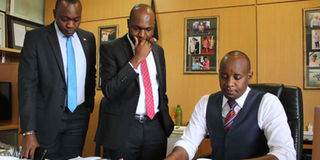NTV journalists spent night on studio floor to escape arrest

NTV general manager Linus Kaikai (right) and journalists Ken Mijungu (left) and Larry Madowo gather for an interview at Nation Centre on February 1, 2018. They condemned the harassment of journalists by the government. PHOTO | WILLIAM OERI | NATION MEDIA GROUP
What you need to know:
- Dr Matiang’i had also vowed to investigate unnamed individual journalists and media houses.
- Mr Kaikai described the crack down as “a step back” and “assault” on press freedom in the country.
Three NTV journalists spent Wednesday night at the Nation Media Group headquarters in Nairobi to avoid arrest by plainclothes police officers who had surrounded Nation Centre waiting for them.
Mr Linus Kaikai, NTV’s general manager, and anchors Larry Madowo and Ken Mijungu got wind of plans to arrest them as they prepared for the evening news bulletin.
The three slept on the floor in one of the television studios, on mattresses procured by their employer when it became apparent that the cat-and-mouse game would play into the night.
FEAR
Worried family members brought them a change of clothes as colleagues came through with dinner — which they cheekily christened “the last supper”.
On Thursday morning, a calm Mr Kaikai narrated what transpired, amid numerous interruptions by phone calls from concerned friends and curious international media organisations seeking to interview them.
The trio spent the better part of Thursday morning consulting with lawyers, human rights activists and fielding questions from a battery of journalists — both foreign and local.
At some point, our interview was interrupted for the umpteenth time to watch a CNN story on the matter.
“I am a journalist. Journalists don’t fear. If you are a journalist and you fear, then you are not a journalist. Fear is for someone else, not a journalist,” Mr Kaikai said.
PROBE
A few hours to the news of the impending arrest of the journalists, Interior Cabinet Secretary Fred Matiang’i had announced that three television stations shut by the government on Tuesday would remain off air until investigations into subversion allegations against them were complete.
The Communications Authority (CA) pulled the plug on NTV, KTN and Citizen TV after they defied a government order not to broadcast opposition leader Raila Odinga’s ‘swearing-in’ as the ‘people’s president’ at Uhuru Park in the capital city.
Dr Matiang’i had also vowed to investigate unnamed individual journalists and media houses.
“We have commenced a wide-scale investigation targeting individuals and organisations who include, but may not be limited to, certain media houses," Dr Matiang’i said.
“We will act decisively, but strictly according to the law.”
SOLIDARITY
News of the nocturnal siege hit social media immediately it became apparent that the police had laid an ambush for the three.
Even some of the harshest critics of the media sent out tweets of allegiance and encouragement to the journalists, who had been holed up on the fifth floor of the “twin towers”.
Journalists from other media organisations put their rivalries and ideological differences aside and trooped in in their numbers to stand in solidarity with their besieged colleagues.
Some stayed on, leaving as late as 2:30am after ensuring that the journalists were safely “tucked in”.
Mr Madowo, one of Kenya’s most popular TV anchors, took to Twitter to express his disappointment.
“I was in the control room producing NTV Kenya’s coverage when we were switched off,” Mr Madowo narrated.
“I am stunned by the government’s justification for this flagrant violation of our Constitution. If journalism is now outlawed in Kenya, I am ready to be investigated.”
HARASSMENT
The show host, known for his hard-hitting weekly "SideBar", which is popular for its fiery panellists, said he was disappointed, though not surprised, with the way the government is treating Kenyan journalists.
“We are becoming just another African country … anyone who appreciates how far we have come cannot accept this,” a defiant Madowo said.
“In future, these crack downs will become normalised.”
For Mr Kaikai, the Kenya Editors Guild chairman, who has been in the industry for 20 years, it is not the first time he has had a “situation” with the government.
EXPRESSION
He described the crack down as “a step back” and an “assault” on press freedom in the country.
“Actually, this is a rule of the law question. How is it possible for the government to pull the plug on businesses? Mr Kaikai said.
“It is not just about the freedom of expression but also about the right to do business, because we pay taxes just like any other business. When all this cools down, it will be found that this was not thoughtful and it was needless.”





